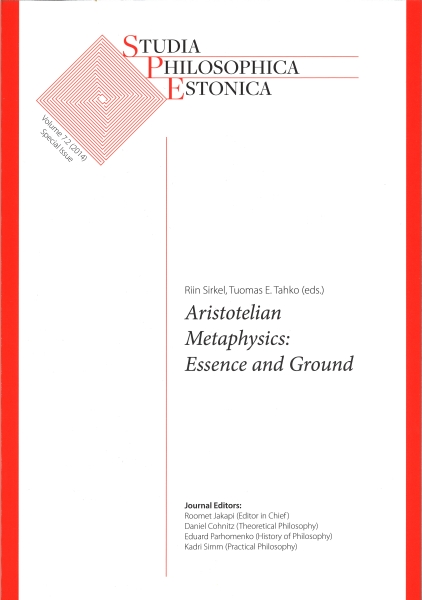Essence, Essence, and Essence
DOI:
https://doi.org/10.12697/spe.2014.7.2.05Keywords:
essence, necessity, temporal essence, Aristotelian essentialismAbstract
I argue that three different notions of essence—temporal, definitional, and modal—are all distinct notions, and are all philosophically useful. After defining the different notions, I discuss the philosophical problems each addresses.
Downloads
References
Broadie, S. (2004). On Generation and Corruption i.4: Distinguishing alteration-substantial change, elemental change, and first matter in GC, in F. de Haas and J. Mansfeld (eds), Symposium Aristotelicum: Aristotle’s On Generation and Corruption I, Oxford University Press, Oxford, pp. 123-150.
Brody, B. A. (1973). Why settle for anything less than good old-fashioned aristotelian essentialism?, Nous 7(4): 351-365.
Carnap, R. (1956). Meaning and Necessity, University of Chicago Press, Chicago.
Charles, D. (2000). Aristotle on Meaning and Essence, Oxford University Press, Oxford.
Chisholm, R. M. (1967). Identity through possible worlds: Some questions, Nous 1(1): 1-8.
Copi, I. M. (1954). Essence and accident, The Journal of Philosophy 51(23): 706-719.
Correia, F. (2012). On the reduction of necessity to essence, Philosophy and Phenomenological Research 84(3): 639-653.
Correia, F. and Schnieder, B. (eds) (2012). Metaphysical Grounding: Understanding the Structure of Reality, Cambridge University Press, Cambridge.
Cowling, S. (2013). The modal view of essence, Canadian Journal of Philosophy 43(2): 248-266.
Divers, J. (2002). Possible Worlds, Routledge, New York.
Fine, K. (1994). Essence and modality, in J. E. Tomberlin (ed.), Philosophical Perpectives VIII: Logic and Language, Ridgeview Pub Co, pp. 1-16.
Fine, K. (2001). The question of realism, Philosophers’ Imprint 1(1): 1-30.
Fine, K. (2012). Guide to ground, in F. Correia and B. Schnieder (eds), Metaphysical Grounding: Understanding the Structure of Reality, Cambridge University Press, Cambridge, pp. 37-80.
Gorman, M. (2005). The essential and the accidental, Ratio 18(3): 276-289.
Horwich, P. (1998). Truth, 2nd edn, Clarendon Press, Oxford.
Koslicki, K. (2012). Essence, necessity and explanation, in T. Tahko (ed.), Contemporary Aristotelian Metaphysics, Cambridge University Press, Cambridge, pp. 187-206.
Kripke, S. (1971). Identity and necessity, in M. K. Munitz (ed.), Identity and Individuation, New York University Press, pp. 135-164.
Kripke, S. (1980). Naming and Necessity, Harvard University Press, Cambridge, Mass.
Kung, J. (1977). Aristotle on essence and explanation, Philosophical Studies 31(6): 361-383.
Lewis, D. (1986). On the Plurality of Worlds, Blackwell, Oxford.
Lowe, E. (2012). Asymmetrical dependence in individuation, in F. Correia and B. Schnieder (eds), Metaphysical Grounding: Understanding the Structure of Reality, Cambridge University Press, Cambridge, pp. 214-233.
Mackie, P. (2006). How Things Might Have Been, Clarendon Press, Oxford.
Marcus, R. B. (1971). Essential attribution, The Journal of Philosophy 68: 187-202.
Oderberg, D. S. (2007). Real Essentialism, Routledge, New York.
Rosen, G. (2010). Metaphysical dependence: Grounding and reduction, in B. Hale and A. Hoffmann (eds), Modality: Metaphysics, Logic, and Epistemology, Oxford University Press, Oxford, pp. 109-36.
Schaffer, J. (2009). On what grounds what, in D. Chalmers, D. Manley and R. Wasserman (eds), Metametaphysics, Oxford University Press, Oxford, pp. 357-83.
Sider, T. (2011). Writing the Book of the World, Oxford University Press, Oxford.
Witt, C. (1989). Substance and Essence in Aristotle, Cornell University Press, Cornell.

